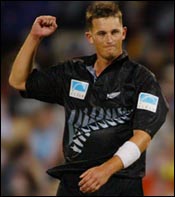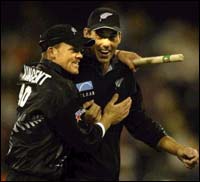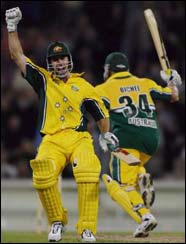Kudos to the Kiwis
Daniel Laidlaw
It was not supposed to be like this.
The annual Australian one-day tournament is designed for the home team to
make the finals. The statistics are revealing. Australia has won 10 of the
last 12 tournaments, including the last four, and has not missed the finals
for five seasons. The schedule - for economic reasons, not anything
sinister - ensures they do not play matches on consecutive days in the same
city, the home conditions and crowd support provides an advantage, and they
have not been hurt by umpiring decisions in recent seasons, either.
Then there is the protracted 8-game preliminary schedule for each team, the
longest for any triangular tournament in the world, which allows for a
recovery from mediocre performances like those seen by Australia this
tournament, the expanded fixture list not making for the most appealing
one-day contests when the intensity of sudden-death encounters provides a
lot of the drama. To reach the finals (uniquely best of three, making it
even longer), the home team only has to be better than the poorer of the two
touring teams, virtually a sure bet in most seasons when one, like South
Africa, has already been cowed in the Tests and is pining for home.
 The problem is that against two well-credentialed opponents in South Africa
and New Zealand, they haven't been. Despite the favourable factors,
Australia's win-loss record after six games of this campaign was a miserable
2-4, bad enough that they had to rely on a Bevan-inspired comeback against
New Zealand, all but assured of one finals berth, just to keep their fate in
their own hands for the last preliminary clash with the Proteas.
The problem is that against two well-credentialed opponents in South Africa
and New Zealand, they haven't been. Despite the favourable factors,
Australia's win-loss record after six games of this campaign was a miserable
2-4, bad enough that they had to rely on a Bevan-inspired comeback against
New Zealand, all but assured of one finals berth, just to keep their fate in
their own hands for the last preliminary clash with the Proteas.
Steve Waugh thinks there are too many experts with too many theories on Australia's woes, preferring to dismiss the losses as simply poor cricket,
which is understandable given too much has been read into the defeats.
Nevertheless, critics are entitled to search for answers when the No. 1 team
finds itself running third in a three-horse home race. Inevitably, the
search focuses on what the champs have done wrong, rather than what their
opponents have done right.
Possibly, one of the reasons there are few meaningful answers to be found to
rectify Australia's slump (other than the tried-and-true lose early wickets,
let Bevan handle the rest formula to which they have sagely returned) is
that they are doing little different to what brought them success in their
last three one-day series and a post-World Cup win-loss record of 40-10-2
prior to this tri-series. The difference has been the level of play of their
opponents. Specifically, the not-so-surprising New Zealanders.
The perennial underdog Kiwis were tipped to be forgotten as the might of
Australia and South Africa squared off against each other in a limited-overs
interlude before their lopsided battle for Test supremacy resumed on the
veldt. But in this series, the Black Caps have never been more undeserving
of their patented underdog reputation.
There is a tendency to overlook the fact that New Zealand, reigning World
Cup semifinalists (they beat Australia then, too) and ICC knockout Cup
champs, are a highly competitive unit in their preferred form of the game.
Their batting runs deep, they are captained astutely, the bowlers are more
disciplined than previously and in this series at least they have been
passionate and committed in the field. And they love beating Australia.
 Ever since he boldly declared when behind in the first Test to throw the
pressure back on Steve Waugh, Stephen Fleming has been the most imaginative
of the international captains in Australia this season. Fleming has found
none of the demons that have apparently haunted Shaun Pollock and South
Africa on tour. He has been more relaxed than Pollock and, in the one-day
game, more successful than Waugh.
Ever since he boldly declared when behind in the first Test to throw the
pressure back on Steve Waugh, Stephen Fleming has been the most imaginative
of the international captains in Australia this season. Fleming has found
none of the demons that have apparently haunted Shaun Pollock and South
Africa on tour. He has been more relaxed than Pollock and, in the one-day
game, more successful than Waugh.
Until Tuesday night, when Bevan added to his legend of performing in the
clutch with a remarkable hundred in dire circumstances, the series could
hardly have gone better for the ecstatic Kiwis. They were 3-0 against
Australia after having beaten them at their own game, a credit to Fleming's
inventiveness and the discipline and execution of his players.
The travelling supporters revelled in it. In Adelaide, a rowdy Kiwi bunch
made more noise than any section of the 28,000 Aussie supporters on
Australia Day, triumphantly taunting the subdued Australian fans with "if
you're bored at the cricket, go away" and "where are you going? Home, home,
home!" as the glum-faced patrons filed out early after Shane Bond had
effectively decided the match by the eighth over of the second innings.
They even created their own humorously makeshift miniature New Zealand flags by
deforming the readily-available Australian ones, punching out the middle
star and excising the larger one beneath the Union Jack. Hey presto, a
four-starred Kiwi flag.
The keenest contests this season have been all trans-Tasman and Bond was
nearly the match-winner for the second game in succession against Australia.
Needing to win to retain control of their series destiny, the concern showed
on the faces of the Australians as consistent middle order batting pushed
New Zealand to a more than competitive 245/8 at the MCG. In the field, the
tactics were superb.
Damien Martyn, supreme through cover and square of the wicket, was nullified
by a congested off-side field. Fleming cleverly employed a gully, point,
short cover, extra cover and mid off to close down the scoring zones on the
off side. Bond, Adams and Nash bowled to their field and with the scoring
rate consequently plummeting, Martyn succumbed to the pressure and cut
weakly to gully, the same mode of dismissal as the last game. The Kiwis have
found weaknesses through experimentation that the South Africans have not.
 Australia were 26/4 chasing in Adelaide and, harried and pressurised, were a
similarly hopeless 82/6 in their penultimate preliminary game after more
failures by Mark Waugh, Gilchrist and Ponting. Whereas no batsman had the
patience or skill to stand up to New Zealand for a lengthy innings in the
first three games, here Bevan managed it in expert style, mostly restrained
until Australia lost its 7th wicket in the 37th over, when he took more
calculated risks. Crucially, the lower order also contributed for the first
time, the 81-run stand off 65 balls with Lee (27) pivotal in a two-wicket
comeback thriller.
Australia were 26/4 chasing in Adelaide and, harried and pressurised, were a
similarly hopeless 82/6 in their penultimate preliminary game after more
failures by Mark Waugh, Gilchrist and Ponting. Whereas no batsman had the
patience or skill to stand up to New Zealand for a lengthy innings in the
first three games, here Bevan managed it in expert style, mostly restrained
until Australia lost its 7th wicket in the 37th over, when he took more
calculated risks. Crucially, the lower order also contributed for the first
time, the 81-run stand off 65 balls with Lee (27) pivotal in a two-wicket
comeback thriller.
Nonetheless, it has been New Zealand's series to date, but they may come to
regret failing to finish off the Aussies when they had the chance. No matter
how many preliminary games are won, if you don't win the finals of
tournaments, you have won nothing in one-day cricket at all. The last
Australia-South Africa game in Perth will now decide New Zealand's
opponents. And remember, Australia are not supposed to miss the finals.
More Columns
Mail Daniel Laidlaw